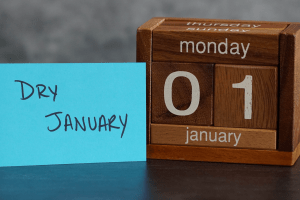
National Institute on Alcohol Abuse and Alcoholism (NIAAA)
Take Time to Reflect on the Role Alcohol Plays in Your Life

Spring is a great time to think about your drinking patterns and how alcohol may affect your life.
Although most people who drink do so in moderation, some people drink in a manner that puts them at risk of developing alcohol use disorder (AUD). In the United States, nearly 15 million people have AUD. In addition to AUD, alcohol misuse can result in chronic liver diseases and is associated with a variety of other chronic health conditions including cardiovascular diseases, anxiety and sleep disorders, and cancer. Studies have shown that consuming even one drink a day increases the risk of breast cancer in women.
How can you tell if alcohol has become a problem for you or a loved one? And where can you find help if it has?
Generally, alcohol becomes problematic when it interferes with your daily life. Some signs are: continuing to drink even though it is causing trouble with your family or at work, drinking more than you intended, having to drink more than before to get a desired effect, being unable to stop drinking after repeated attempts, or continuing to drink even though it makes you feel depressed or anxious. For more information about the symptoms of AUD, see https://www.rethinkingdrinking.niaaa.nih.gov/How-much-is-too-much/Whats-the-harm/What-Are-Symptoms-Of-Alcohol-Use-Disorder.aspx. Any of these symptoms may be a cause for concern. The more symptoms one has, the more urgent the need for change.
NIAAA has some valuable interactive resources to help you examine your drinking patterns further and, if needed, find quality care.
Rethinking Drinking is an easy-to-use resource that helps you evaluate your drinking and offers research-based tips to help cut back or stop drinking if needed. It is available online as an interactive tool at https://www.rethinkingdrinking.niaaa.nih.gov or a downloadable brochure at https://pubs.niaaa.nih.gov/publications/RethinkingDrinking/Rethinking_Drinking.pdf.
The NIAAA Alcohol Treatment Navigator is a tool that helps you navigate the often complicated process of finding and choosing a professional alcohol treatment provider. Alcohol treatment comes in different forms, and the Navigator makes the search easier by telling you what you need to know–and what you need to do–to locate appropriate, quality professional care nearby. It is available at https://alcoholtreatment.niaaa.nih.gov.
This spring, take time to reflect on your relationship with alcohol and to learn how to recognize quality care if you or a loved one need to seek treatment for alcohol problems. Remember, if you or a loved one learns that they have AUD, that it is a treatable condition and people do successfully recover. Also, please visit our website to learn more about NIAAA’s research efforts to generate knowledge about the effects of alcohol on health and well-being and how we use that knowledge to improve the diagnosis, prevention, and treatment of alcohol-related problems.
Best wishes, GFK
Need Help for an Alcohol Problem?
If you’re having an emergency, call 911. If you are having suicidal thoughts, call 911, go to the nearest emergency room or call the toll-free, 24-hour National Suicide Prevention Lifeline at 1-800-273-TALK (8255) to help you through this difficult time.
The NIAAA Alcohol Treatment Navigator can help you recognize and find high quality treatment for alcohol use disorder. If you drink excessively, seek medical help to plan a safe recovery as sudden abstinence can be life threatening. NIAAA’s Rethinking Drinking can help you assess your drinking habits and provides information to help you cut back or stop drinking.







